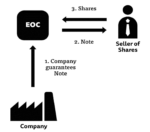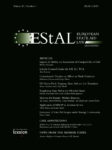One of the problems that cooperatives face is that they do not have a standard gradual conversion mechanism but are generally established as new business startups or by an all-at-once conversion of a conventional company to a cooperative. This paper describes such a conversion mechanism.
Critical Analysis of Different Forms of Employee Ownership
From the 1970’s, there has been almost a half-century of development of employee-owned firms. There has been a wide variety of legal/capital structures that have been tried but too little analysis of which legal forms work or don’t work over the longer term, e.g., the transition from one generation to the next generation of employee-owners. This paper provides a critical analysis of the major forms. The emphasis is the lack of learning between the different forms. The same problems keep recurring even though solutions are known.
Is “Capitalism” a Misnomer? On Marx’s “capitalism” and Knight’s “civilization”
This is an open access article from the European Journal of the History of Economic Thought.
The name “capitalism” derives from Marx’s false analogy between medieval land ownership and the “ownership of the means of production.” However, unlike medieval land, capital goods can be rented out, e.g., by Frank Knight’s entrepreneur, and then the capital owner does not hold those management or product rights. What then is the characteristic institution in our civilization? It is the voluntary renting of workers. What then is the relationship between Classical Liberalism, the dominant philosophy behind Economics, and a lifetime labor contract? Frank Knight had plenty to say against the doctrine of inalienable rights which disallows such contracts.
The Kantian Person/Thing Principle in Political Economy
This is Chapter 4 in my book: Ellerman, David. 1995. Intellectual Trespassing as a Way of Life: Essays in Philosophy, Economics, and Mathematics. Lanham MD: Rowman & Littlefield.
Ethical theories can be broadly grouped into utilitarian theories and rights-based theories. Modern economics is so thoroughly utilitarian that most economists would be hard-pressed to cite the application of a rights-based argument to economic institutions. Yet the normative principles outlined in the first two chapters, the labor theory of property and the de facto theory of inalienability, are squarely within the rights-based tradition. The democratic principle of self-determination is also a closely allied rights-based theory [see Ellerman 1992].
Myth and Metaphor in Orthodox Economics
This is Chapter 2 from: Ellerman, David. 1995. Intellectual Trespassing as a Way of Life: Essays in Philosophy, Economics, and Mathematics. Lanham MD: Rowman & Littlefield.
Discussion of the fundamental questions of political economy is today almost completely clouded and distorted by a number of basic myths and metaphors. Deconstruction is necessary before constructive discussions can begin. The myths and metaphors are concerned with basic conceptions about property and contract, not with prices and markets. As layer upon layer of distortions are removed, new facts and new perspectives on old facts will emerge. These facts have fairly direct normative implications, but the disagreements and controversies are about the facts, not about norms or prescriptions.
Trespassing against the Happy Consciousness of Orthodox Economics
This is Chapter 1 in my book: Ellerman, David. 1995. Intellectual Trespassing as a Way of Life: Essays in Philosophy, Economics, and Mathematics. Lanham MD: Rowman & Littlefield.
This first chapter addresses the problems of trespassing involved in understanding the arguments presented in the first five “controversial” chapters of the collection. These chapters challenge the whole idea of the employer-employee relationship that is the institutional basis for our present version of a private-property market economy. The problems of trespassing against fundamental orthodoxy in the social and moral sciences are of a completely different order of magnitude than the problems of trespassing in the natural and mathematical sciences.
Talk Slides about European ESOP
These are slides from a talk about the European ESOP (Employee Stock Ownership Plan) developed by the Institute for Economic Democracy in Ljubljana, Slovenia.
Worker Cooperatives and other so-called “Cooperatives”
Most cooperative organizations today do not exemplify any cooperative activity; non-worker cooperatives do not represent any cooperative activity of the members since the only joint activity of the organization is carried out by employees. The idea that cooperatives are democratically governed does not apply to non-worker cooperatives (based on the employment relation) since the members are not choosing the managers or governors of their own activity but of the activity of the people working in the cooperative.
European ESOP
The American Employee Stock Ownership Plan or ESOP is a leveraged buyout mechanism so that the employees in a company can, in effect, do a leveraged buyout of part or eventually all of their own company. ESOP is one of the most successful and unifying models for employee ownership in the world. The purpose of this paper is to analyze the main features of the US ESOP model and to define a technical description of the European ESOP, which builds on the good features of the US model and improves the flawed features.
Marcora Law for Europe
There is a time-tested solution in Spain and Italy that provides liquidity to such enterprises in a democratic manner by establishing employee ownership schemes. The new source of liquidity is allowing unemployed workers to capitalize part of their unemployment insurance to invest in a new or existing enterprise where they will have a job.






